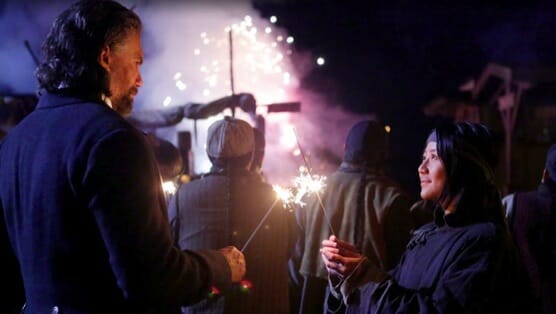Hell on Wheels: “Elixir of Life”
(Episode 5.05)

As the various rivalries piled up in the camps of Truckee and Laramie, it seemed like for the first time in quite a while, Cullen Bohannan had someone in his corner. Cullen has always been a loner, but always filling in to fight on the side of fairness and good. Even until the very end of “Elixir of Life,” it looked as if things were finally coming up Bohannan. But this is Hell on Wheels, where every action has a reaction, every relationship has ulterior motives and no friend can fully be trusted.
This entire season, Cullen has been building his relationship with the Chinese workers of Truckee and by the end of “Elixir of Life,” it seems like the power of Chang’s influence might overcome all of Cullen’s work for equality. While Cullen never quite trusted Chang, their rivalry kicked up a notch once Cullen let go of the white workers who strung up Chang and murdered one of his workers. Cullen almost always tries to do the right thing, yet it’s the one time the law overpowers him that his goodwill comes back to bite him.
Chang lulls Cullen into a false sense of security, offering the truth about delivering the rice, and most importantly, the guns to Thor, and Chang seems willing to bury the hatchet. However, in the episode’s final moments, we see Chang has planned to have Tao—Cullen’s closest friend of the Chinese workers—killed, with only Chinese witnesses to admit that the murderer was white. Instead of seeming like Chang is changing his ways and becoming friendlier, like most of the villains on Hell on Wheels, he’s more interested in the long con of deception.
This has especially been the case with Thor, who has convinced Phineas Young that he should be his sort of advisor. Now, as Cullen tries to explain the terrors of Thor, Phineas also turns his back on Cullen. Anyone following Thor is a bad idea, especially since Thor’s plan is growing by the episode. By the end of “Elixir of Life,” not only do the kicked-out Mormons have plenty of guns, but Thor has also convinced Phineas that he has seen a vision of Phineas as the new prophet. Not only does this make Thor essentially the leader of a die hard religious group, but a heavily armed one at that.